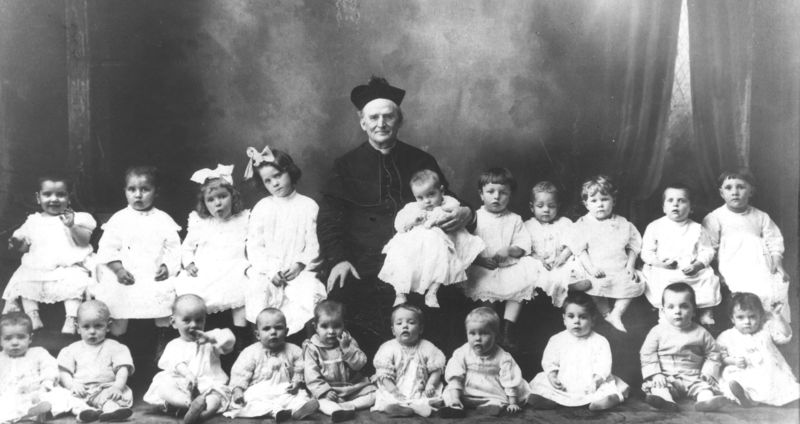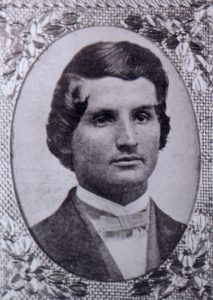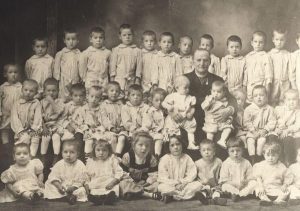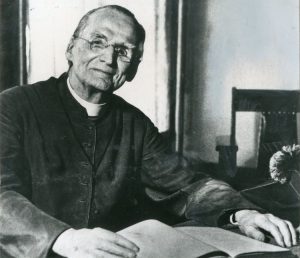
Venerable Nelson Baker was a veteran,a businessman, a priest, and the founder and pastor of an expansive city of charity. Nelson was born in 1842 to Lewis and Caroline Baker in Buffalo, NY. His father operated a general store and the Bakers and their four sons lived behind the store. After completing high school, Nelson worked in his father’s store. He capably handled the business. In the spring of 1863, the Civil War moved into neighboring Pennsylvania, and Nelson enlisted for service. After the war, he returned to Buffalo, and established a feed and grain store. The business was successful.

ENTREPRENEUR TO SEMINARIAN
Nelson became involved with the work of a local orphanage, and after one visit there with the priest administrator, began considering entering the diocesan seminary. Hesitant, because at age twenty-six, his would be a “late vocation”, he continued to work long hours at his business and take classes at night. In the spring of 1869 he was exhausted and needed time to discern. He took a steamer tour of the Great Lakes, where he paused at each stop for Mass, Confession, and prayer. By the time he returned, he was sure of his call, and entered seminary in Buffalo. There, his natural leadership qualities emerged, and he established sports activities, a drama performance group, and a debating club. He established perpetual Eucharistic Adoration (around the clock) and managed the schedule of adorers.
In the fall of 1871, Nelson became ill with a strep-related infection. Since this occurred before antibiotics had been discovered, he nearly died, and it took months before he could walk again. After resuming his studies, he continued to excel, and set out on a pilgrimage to Europe in 1874. He was quite enamored with the Our Lady of Victory shrine in Paris, especially after hearing of the numerous miraculous cures associated with the Virgin Mary under that title.
He was ordained a priest in 1876, and an early assignment was to the orphanage he had supported during his business days. There, he found an institution deeply in debt and creditors demanding payment. He withdrew his entire life savings from the bank, which helped, but the operating expenses were still great. Asking the intercession of the Virgin Mary under the title Our Lady of Victory, he formed a charitable association by handwriting thousands of letters all across America, asking twenty five cents annual membership dues. The needed support came in, making it possible for needed improvements.
FAILING ORPHANAGE BEGINS TO FLOURISH

Always looking to expand the ministry, Father Baker endeavored to dig for natural gas on the land. After obtaining his bishop’s permission, he lead a procession reciting the rosary, stopping at a specific spot. There, he ordered the oilfield workers to dig. The resulting well produced enough gas to heat the entire facility and beyond. What many thought to be “Father Baker’s folly” is still providing gas. In 1885, his mother, a lifelong Catholic, passed away. His father, who lived his life “unchurched”, often came to visit his son. Fearing that he would never see his beloved wife again, and in failing health himself, he consented at last to be baptized and anointed by his son before his death.
The orphanage facilities came to be named after Fr. Baker’s patroness, Our Lady of Victory. By the beginning of the twentieth century, the reputation of Father Baker’s facility had spread, and the number of orphans had tripled, arriving from every state in the nation. In time, Father continued his vision of building to meet the needs of the boys who came to him. His network of financial supporters remained faithful to him, enabling him to educate the boys in everything from landscaping to operating a dairy. He was able to open a home in Buffalo for boys old enough to work.

After the horror of a discovery of numerous infant skeletal remains during the dredging of the nearby Erie Canal, Fr. Baker built a home for unwed mothers. For those who wished to remain anonymous, a crib was set out so an unwanted infant could be left there and cared for. With time, a small maternity hospital was built, and by 1911, a full-size general hospital was added. In the 1920’s Father realized a long-held dream and had a beautiful church built, debt-free, to honor Our Lady of Victory. Over the years, many destitute people had come to Fr. Baker, who was always generous with giving away food and whatever coins or dollar bills he had.
A TIME OF GREATEST NEED
When the Great Depression hit, thousands of people came needing help. Estimates indicate that more than 500,000 people were fed at Our Lady of Victory during those years. In his nineties, Father committed himself to the care of the many needy black people, who had come from the south seeking employment. He taught them the Catholic faith, and thousands of “Father Baker’s Negroes” received the sacraments of initiation into the Catholic Church. Sharp-minded to the end, he died July 29, 1936 at age ninety-four. The outpouring of grief was widespread, and between 300,000 and 500,000 people visited before his funeral.
At the time of his death, Father Nelson Baker had not a dollar to his name, although vast sums of money from his network of supporters passed through his hands for the needs of the orphaned and the poor. In addition to teaching “his boys” practical life skills, he also taught them virtues such as hard work and generosity. Many of them went on to become physicians, priests, and other professionals. He was known as a man of miracles, many of which were recorded, and all of which he attributed to Our Lady of Victory, to whom he had a constant devotion. He was a man of prayer, and had an outdoor prayer path where he spent time alone each day. He made nightly rounds, visiting the infants last, often lulling one or another to sleep. His cluster of Our Lady of Victory homes and services in what is now Lackawanna, NY still exist and operate on charitable donations. In 1987 Father Baker was named Servant of God, and 2011 was declared Venerable.
